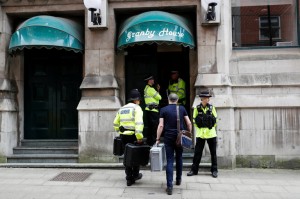Bomber’s Trips to Syria and Libya Suggest He Had Help
< < Go Back
Salman Abedi, who carried out Britain’s deadliest terrorist attack since 2005, had recently traveled to two Islamic State strongholds. Investigators believe he likely got help planning the Manchester bombing.
Britain is on the highest level of alert — “critical,” meaning that a further attack “may be imminent.”
At an afternoon news conference, Chief Constable Ian Hopkins of the Greater Manchester Police confirmed that investigators were looking for accomplices, but he declined to specify whether the police were searching for a bombmaker.
“This is a network that we are investigating,” he told journalists. “There’s an extensive investigation going on, and activity taking place across Greater Manchester as we speak.”
In fact, minutes before he spoke, the police had set off a controlled explosion at a house in the city center; a few hours earlier, they arrested three men in connection with the investigation, bringing the total number of people in custody to four. What role those men might have played in the attack is not yet clear.
The government decided Tuesday evening to put the country on the highest level of alert — critical, meaning that a further attack “may be imminent” — since 2014.
That decision was made because the authorities were still trying to find the “factory” where the bomb was produced and to discern whether Mr. Abedi had received help assembling the device, according to a law enforcement official who spoke on the condition of anonymity because of the secrecy surrounding the investigation.
The BBC, citing unidentified intelligence sources, reported on Wednesday that officials believed Mr. Abedi had been a “mule,” carrying a bomb made by someone else.
Officials also said that they were looking into Mr. Abedi’s relationship with Raphael Hostey, a British recruiter for the Islamic State who is believed to have been killed in a drone strike last year.
The arrests came as Britain mobilized its armed forces to guard vital locations. Public tours of Parliament were called off until further notice, and the guard-changing ceremony at Buckingham Palace, long a favorite of tourists, was canceled. The military said it would deploy soldiers to support policing at Downing Street, the home and office of the prime minister; at the palace; at Parliament; and at embassies, among other sites.
More From The New York Times:




